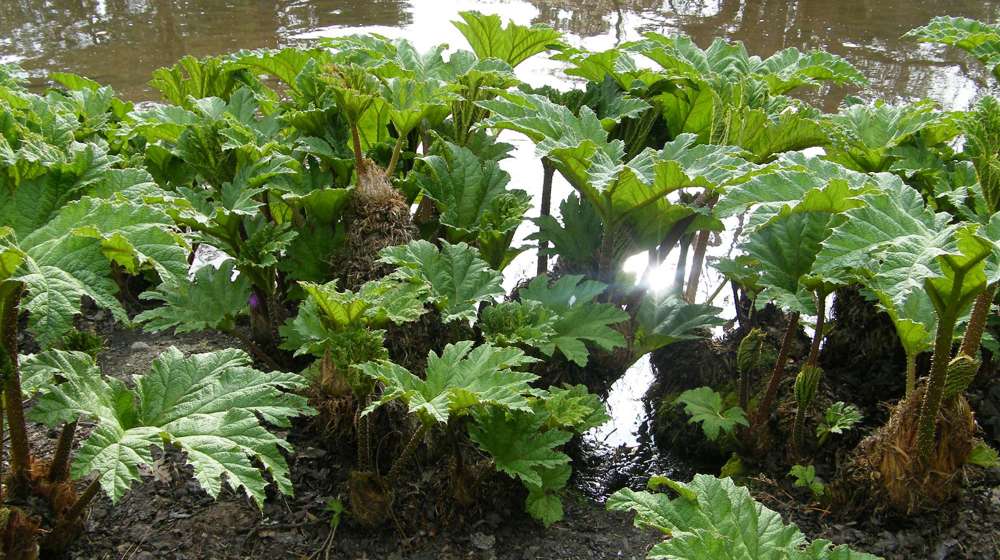-
-
-
-
-
-
-
-
-
-
Gunnera
-
-
-
-
-
-
-
-
-

Gunnera
| Common name: | Gunnera |
| Scientific name: | Gunnera tinctoria |
| Management programme: | Site-led |
Gunnera (also known as Chilean rhubarb) is a large, invasive plant that forms dense colonies around bluffs, wet cliffs and near waterways. Its large leaves can grow up to a metre wide and shade out and supress native vegetation.
Gunnera produce an abundance of seed which can be spread down waterways, and also spread through rhizomes, making this plant challenging to control.
- Size: Large, clump-forming, summer-green herb that grows up to 2 metres tall.
- Leaves: Rough with 5-7 lobes and can grow up to 1 metre wide, supported by sturdy stalks. Both leaves and stalks are covered in rubbery red prickles.
- Flowers: tiny, densely packed green flowers form on long, erect, conical spikes, and develop into reddish, oblong fruit containing a single seed.
- Root system: Underground, the plant consists of a long rhizomes (an underground fleshy stem).
- Similar species: Gunnera manicata is a similar species and can be distinguished by its membranous webbing between the lobes of leaves.
- Habitat: Areas with moist soils and high sunlight, including coastal cliffs, forests, forest edges, rivers and stream banks, drains and wetlands.
Gunnera dies down over winter (June-August) in cold climates and grows new leaves in spring (September-November) from large, lobed, scaly buds that are pinkish-green when fresh and dry to brown. It is best spotted between spring to summer.
To prevent or improve on damage to indigenous ecosystems, Gunnera is in the Site-Led Programme of the Otago Regional Pest Management Plan (2019-2029). The Dunedin Site-Led areas include West Harbour – Mt Cargill, Quarantine and Goat Island, and Otago Peninsula. There are no specific rules associated with Site-Led pest plants in the plan.
Gunnera is declared an Unwanted Organism in the National Pest Plant Accord. This means it cannot be sold or be in a place where plants are being sold. It cannot be propagated, bred, multiplied, communicated, released, caused to be released, or otherwise spread.
ORC will take a lead role in supporting the goals of community groups and agencies in site-led areas in relation to Gunnera. This may be through advice, education, funding, service delivery or requiring other landowners undertake control when needed.
Physical control:
- Remove flower spikes and seedlings and dispose at landfill (year-round).
- Pull or dig out individual plants: ensure removal of all rhizomes (an underground fleshy stem) and seed/flower heads and dispose at landfill (year-round).
Chemical control:
- Cut and paste the stump near the ground using a suitable herbicide gel containing either Picloram or Glyphosate (spring).
- Foliage spray when the plant is actively growing using glyphosate and penetrant (spring).
Caution: When using any herbicide or pesticide PLEASE READ THE LABEL THOROUGHLY to ensure that all instructions and safety requirements are followed.
Disclaimer: Mention of product trade names does not endorse these products nor imply criticism of similar products not mentioned. The Otago Regional Council does not give any warranty that the information is accurate or complete or that it is suitable for all circumstances.
Site-led
Site-led programmes have rules for specific pests that only apply in that area. Site-led areas have special biodiversity and other values to protect.
National Pest Plant Accord (NPPA)
Any plant listed on the NPPA is an unwanted organism under the Biosecurity Act 1993. This means they cannot be distributed or sold in New Zealand.
www.orc.govt.nz/gunnera













